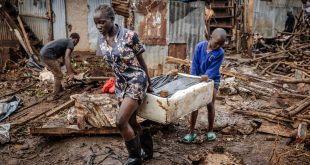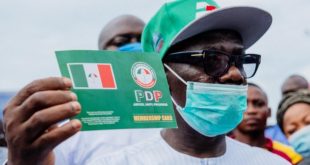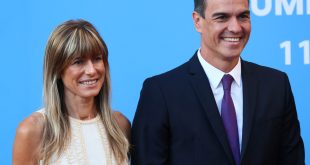We’re covering Russia’s attempts to encircle eastern Ukraine and the emergence of armed militias in Colombia.
Russia threatens escalation with missile test
As Russia continued its offensive in the Donbas region of Ukraine by raining artillery across the 300-mile eastern front, it took the provocative step of test launching an intercontinental ballistic missile designed to evade defenses.
While the technology is said to need more testing before it can be deployed, President Vladimir Putin said the new missile should cause anyone threatening Russia to “think twice.” The U.S. and its allies have been racing to deliver more advanced weapons to the Ukrainians.
No major battles have been waged in the days since the start of the offensive, and no significant territory has changed hands, but Russia’s superior weaponry and a more favorable terrain suggest a bloody fight to come. Those on the so-called line of contact with separatist territory in Ukraine’s east have begun to get a taste of what Russia’s military has in store.
In Mariupol: Ukrainian soldiers continued to hold out against Russian bombardment inside a sprawling steel factory in the southeastern port city. One Ukrainian commander warned that the remaining troops and civilians with them could be killed within hours.
The troops defied a Russian deadline to surrender, though a tentative deal was reached to allow women and children to evacuate the city. It was unclear whether civilians inside the steel plant would be covered by the deal.
Protest: Several global finance officials, including U.S. Treasury Secretary Janet Yellen and Ukraine’s finance minister, Serhiy Marchenko, abruptly left a Group of 20 meeting when Russia’s finance minister started to speak, according to a person familiar with the meeting.
Shanghai’s low Covid death toll raises questions
On paper, Shanghai’s handling of its recent outbreak of the coronavirus looks praiseworthy: With more than 400,000 infections, only 17 people have died.
But those numbers may not give a complete picture of the outbreak’s toll. China’s lack of transparency and stringent method for counting deaths linked to Covid suggest that the real death toll of the virus could be significantly higher. The country has officially reported fewer than 5,000 deaths from the coronavirus in two years.
A prominent Shanghai physician, Miao Xiaohui, recently estimated that nearly 1,000 more diabetes patients could die than expected during Shanghai’s lockdown, and, in a blog post that was censored, urged the government to take a more measured approach. But Beijing is unlikely to waver, as its leader, Xi Jinping, has made the country’s low death and infection rates central to his administration’s legitimacy.
In other pandemic developments:
In Colombia, armed groups battle over drug trade
With attractive salaries and perks, illegal armed groups have recruited hundreds of rebels, soldiers and paramilitaries in their fight for control over sections of the Colombian Amazon that play a critical role in the drug trade.
In 2016, the government signed a peace accord with the Revolutionary Armed Forces of Colombia, or FARC, and promised to flood conflict zones with job opportunities. But violence has returned, or even increased, in the territorial vacuum left by the old insurgency and government inaction. Massacres and the killings of human rights defenders have soared. Displacement remains startlingly high, with 147,000 people forced to flee their homes last year alone, according to government data.
Increasingly, it is civilians who are suffering most, trapped between more than 30 warring militias that have emerged in the last five years.
Times reporters spent a week with the Comandos de la Frontera, a group formed in 2017, visiting towns under their control, watching them move weapons and buy drugs, and sleeping at a camp where fighters set off grenades and ran drills without any police or military in sight.
Warnings: Some security experts said that if the government did not take on a greater role in quelling these militias, the country could be headed toward a state that looks more like Mexico — ravaged by drug gangs vying for territory — than the Colombia of the 2000s.
THE LATEST NEWS
Asia
In 1880, the Star Ferry was founded by a Parsi businessman who had come to Hong Kong from Mumbai as a stowaway. It became the first scheduled public ferry service to connect Hong Kong Island to the Kowloon Peninsula, and the Chinese territory beyond it. In the 142 years since, it has become part of the lifeblood of the city. But battered by the pandemic — and China’s crackdown on the island — the service is struggling to survive.
ARTS AND IDEAS
Drawn and caricatured
Days before French voters go to the polls to choose their next president, the nation’s political cartoonists are out in force, ready to accentuate even the smallest slip, Saskia Solomon reports for The Times.
Political cartoons have deep roots in France, thriving as expressions of unhappiness during the French Revolution and continuing to play an outsize role in modern-day politics. Comic books regularly top the French best seller lists, and weekly satirical newspapers — most notably Charlie Hebdo and Le Canard Enchaîné — are considered national institutions.
Several veteran cartoonists are working on a 240-page comic book, titled “Campaign Notebooks,” about the 2022 presidential election. Each artist was assigned one or two candidates to follow for the course of the campaign — most of whom were eliminated in the first round on April 10.
Most of the book is already written. But the last 12 pages of the book are still blank, awaiting a final result that is likely to be close. “Anything can happen,” said Mathieu Sapin, the book’s creator. “That’s what makes it so thrilling.”
PLAY, WATCH, EAT
What to Cook
Adding an orange, rind and all, to this easy snacking cake imparts a wonderful flavor, pleasantly bitter and sweet.
What to Read
“Rouge Street,” a suite of three novellas by Shuang Xuetao, gives voice to characters in China’s Rust Belt.
What to Watch
Jerrod Carmichael’s HBO stand-up special “Rothaniel,” which explores family secrets and sexual orientation, is “remarkable,” Wesley Morris writes.
 Top Naija News: Nigerian News, Breaking News Nigeria and World News Top Naija News is a daily news publication in Nigeria, delivering the latest breaking news in Nigeria and around the world.
Top Naija News: Nigerian News, Breaking News Nigeria and World News Top Naija News is a daily news publication in Nigeria, delivering the latest breaking news in Nigeria and around the world.



